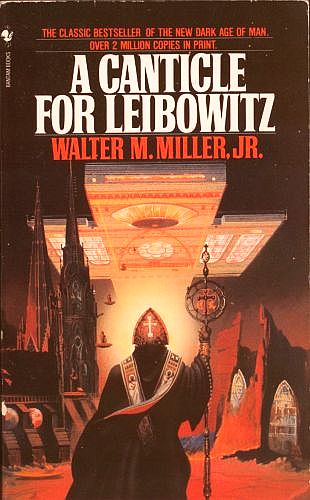

|
| Cover art by Peter Jones |
| A CANTICLE FOR LEIBOWITZ Walter M. Miller, Jr. New York: Bantam Books, August 1976 (© 1959) |
Rating: 5.0 High |
|||
| ISBN-13 978-0-553-27381-6 | ||||
| ISBN 0-553-27381-7 | 313pp. | SC | $6.50 | |
Brother Francis Gerard, runaway from a pagan tribe in Utah, novice at the Albertian Order of Leibowitz, was on his first Lenten vigil. It required him to live off the land, to build his own crude stone shelter against wolves, to endure the heat and cold. Only thus could he demonstrate his calling to the Order. It was no bed of roses. But one day a wizened old pilgrim plodded by his refuge, telling him where he could find a capstone for it, and moving on. Later he found the stone the old man had pointed to. It was marked with two odd symbols, and when Francis pried it out, he found it fit his shelter perfectly. Then he looked at what was in the pit under the stone. That's when his trouble started.
For six centuries, ever since the time of the Flame Deluge, the ancient monastery in the Arizona desert that housed the Order had been a repository for the Memorabilia: all the relics that could be located from the ancient civilization that preceded the Deluge. Few of the documents and artifacts unearthed were understood, but each was regarded as a treasure. So Brother Francis, realizing the hole contained relics associated with the Blessed Leibowitz himself, was understandably elated. But it was a cautious elation.
"Providence had bestowed a blessing here. To find a bit of the past which had escaped both the bonfires and the looting scavengers was a rare stroke of luck these days. There was, however, always a risk involved. Monastic excavators, alert for ancient treasure, had been known to emerge from a hole in the ground, triumphantly carrying a strange cylindrical artifact, and then—while cleaning it or trying to ascertain its purpose—press the wrong button or twist the wrong knob, thereby ending the matter without benefit of clergy." – Page 21 |
Walter Miller, Jr. was not a prolific author. This is the novel for which he is best known. It evinces a superior level of craftsmanship and a profound level of insight — as well as a profound bitterness about the ultimate fate of that weirdly complex species Homo sapiens. At its opening, six hundred years after the civilization we know has ended itself in global thermonuclear war, little is known of the cause of the conflict, or its history: not even who started it. More importantly, little remains of the knowledge so arduously achieved by that fabled civilization. It is a world where candles provide light, horses and mules provide transportation, quill pens provide record-keeping — and arrows, knives and swords provide the tools for war-making.
But as the centuries pass, the old drives for knowledge and power reawaken. Another six hundred years bring empires which support institutes where scholars resurrect the bones of ancient scientific theories and painstakingly flesh them out. One such is Thon Taleo, and the Memorabilia preserved by the Order enable him to enormously advance his particular specialty. Eighteen hundred years after the Deluge, human arts have erased the gap and in some ways surpassed the Ancients. There is the Bergstun Interstellar Drive by means of which struggling colonies have been planted in several other star systems. And there are also thermonuclear weapons which, coupled with man's inherent folly, bring a searing repeat of history.
"Abbott Dom Zerchi switched off the set. He paced for a while, waiting for Joshua, trying not to think. But "not thinking" proved impossible. Listen, are we helpless? Are we doomed to do it again and again and again? Have we no choice but to play the Phoenix in an unending sequence of rise and fall? Assyria, Babylon, Egypt, Greece, Carthage, Rome, the Empires of Charlemagne and the Turk. Ground to dust and plowed with salt. Spain, France, Britain, America—burned into the oblivion of the centuries. And again and again and again. Are we doomed to it, Lord, chained to the pendulum of our own mad clockwork, helpless to halt its swing? This time, it will swing us to oblivion, he thought. – Page 245 |
There's no happy ending to this novel. It leaves us with Earth blasted once again into radioactive chaos. But hope is not totally dead; it rides with a carefully chosen group of monks from the Order of Leibowitz, shepherding the Memorabilia and their faith across the star lanes to an unknown fate. There is wry humor in the book, but it carries a bitter undertone. The mood of Canticle as a whole is one of bitterness and resignation, understandable emotions at the height of the Cold War. But it does not descend into despair; humanity survives to try again.1 Because of this, and the quality of its writing, I give it full marks and consider it a keeper.

 To contact Chris Winter, send email to this address.
To contact Chris Winter, send email to this address.